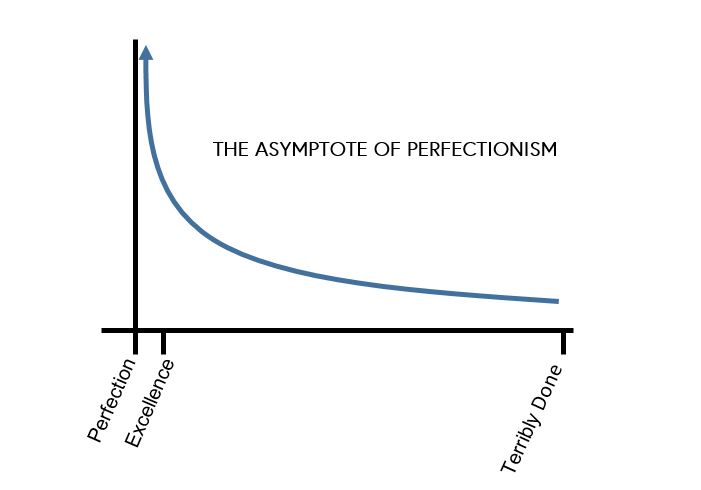If you are not a perfectionist, this post may not make much sense. (As ever, it’s important to know where you are to know where you need to aim. If you don’t suffer with perfectionism, the advice below probably doesn’t apply to you.)
As a Christian, I’ve really struggled with sorting out my perfectionism. Doesn’t the scripture exhort us to “be perfect as your heavenly Father is perfect”? If I want things to be perfect, isn’t that a good thing?
Turns out, perfection isn’t that simple. God’s perfection and my perfection are different things.
The Latin roots give a bit of a clue. Per ( = “through”) fectus ( = “having been done”) All the way done through. Cooked like the Thanksgiving turkey. Nothing else can be done.
God is perfect in that sense. We can’t add anything to God to make Him better: He is complete in and of Himself. (Which, incidentally, is why our creation and existence is such a gift. God absolutely did not need to make us. And yet, here we are!)
But, unlike God, I exist in time. Until heaven, I’m never going to be “all the way done.” And certainly the things I do could always be better. It’s really rare to have a project where I think, if I touch it anymore I’ll ruin it. The perfectionist in me can always think of ways to improve, to nit-pick, to make it just a little more perfect.
(Not everyone has this problem. Some people know when they’ve done a job well, and they’re happy to walk away. Lucky them!)
But the perfectionist can’t walk away. There’s always one more thing to change. It’s making a god out of Perfection, rather than just letting God be Perfect.
So, what’s to be done? Embrace shoddy work? Start half-arsing projects with reckless abandon? Take pride in a job poorly done? We’ve all experienced the fruit of such labors: an appliance that wasn’t installed correctly, a garment that tears too easily, dirty bathrooms that were “cleaned” half-heartedly.
I don’t think the answer is to give up trying to do things well. I think the answer involves understanding the difference between perfectionism and excellence.
Excellent work stands above the average (ex = “out of”; “cellere” = “rise high, tower”). It’s truly better than many other things. It might not always be the best of the best of the best, but it is distinguished from the crowd.
Yet, the perfectionist can’t be happy with excellence. The truth is, for the perfectionist, “perfect” will always be asymptotic on this side of heaven.
(For those who were happy to leave behind maths in high school, an asymptote is a line that keeps getting closer and closer but never quite reaches the graph’s axis. Like this:

The perfectionist sees nothing short of perfection, even excellence, as acceptable. It’s a paralyzing problem, because, like the asymptote, the perfectionist will never reach her mark.
But the solution can’t be to just give up!
We have to try to do our best in all things. But the perfectionist can experience some freedom by realizing that something can be done well enough, done well, and even done excellently, without being “perfect” in the way God is perfect. (Because nothing on earth is!)
There’s a popular phrase going around these days, which can be helpful for the struggling perfectionist: “Progress, not perfection.” If we are aiming to progress towards our goal, rather than being paralyzed by our inability to meet it perfectly, we can hope and plan to become truly excellent.
What about you? Have you considered that excellence might be exactly what you want, rather than perfection?





